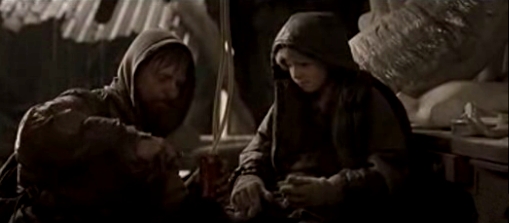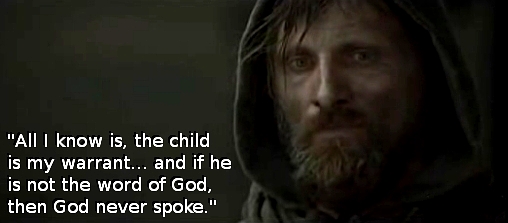The Road
Cormac McCarthy’s The Road is a relentlessly depressing book. Written in a broken, personal diary style that is intended to make it more powerful, the text becomes less so because it seems gimmicky. Still, this tale of survival in a post-apocalyptic world held my attention when I read it, driving me on for page after page much as its protagonist puts one foot stolidly before the other.
The book is about a father and his son, traveling from their point of origin to someplace that, they hope, will be better. They have meager possessions; they carry what they can, and they have a revolver with only two cartridges in it. Along the way, nothing good happens. The father and his son are starving; they’re cold; they can find little to sustain themselves. Every other person they meet is a potential cannibal, a predator in a world where to be prey is the only other option.
The movie based on this book, starring Viggo Mortensen as the father, brings the bleak, gray landscape of McCarthy’s book to life — at least insofar as the dying world McCarthy paints can be “alive.” Mortensen turns in a first-rate performance as he always does. The actor always seems to have a sense of tragedy about him. “You always think bad things are going to happen,” his son mewls when Mortensen urges them to flee a house in which they’ve taken shelter. Unfortunately for them both, the father is right, and the only world his son will ever know is one of privation, fear, disease, and violence. None of the people encountered by this man and his boy have names; they are only categories, and only too soon to be dead themselves.
Kodi Smit-McPhee, who plays the boy, is a capable actor. It is for the boy that Mortensen does everything he does; he refuses to give up because he wants his son to survive. Charlize Theron plays the boy’s mother, and she gives up only too soon. She does not, in fact, even want him to be born, for she is pregnant with him when the bombs explode and the world as this family knew it is ended.
A parent’s devotion to his child is the strongest of emotions. A parent will do anything for a son or daughter, and it is this will, this “warrant,” as Viggo puts it in voice-over narration, that is all the purpose the father needs to keep going. As the pair struggle, Mortensen tries to teach is boy what he can, instilling in him the will to go on.
If this thoroughly sad, soul-crushing, anxious film of loss and impending doom has a message, it is that one: A father must do whatever he can to keep his son alive, and any person who would cause him to fail or who hinders him in that task is merely an obstacle to be removed — by any means necessary. The father tells his son, at the boy’s question, that they are still “the good guys,” and they always will be… but this is a world very much past morality. There is only little life and death — and precious little of the former.
“Did you ever wish you would die?” Mortensen asks Robert Duvall, who plays a filth-encrusted old man the pair encounters.
“It’s foolish to ask for luxuries in times like these,” Duvall says with finality.
“That old man wasn’t a bad guy,” the boy complains, as the old man goes his own way, inevitably to die. Moments later, the father and his son are forced to watch as a mother and child are taken by thugs. There is nothing they can do, and the thought of intervening clearly does not even enter Mortensen’s mind.
The Road will be popular with survivalists and copers for the same reason that other post-apocalyptic tales draw the attention of such people. Unlike most books and movies of survival, or survival-horror, however, there is no hope to be had here. Although perhaps that’s too harsh; the movie does not rob of us all possibility for survival completely, numbing though it is.
Perhaps that, ultimately, is also its message.



